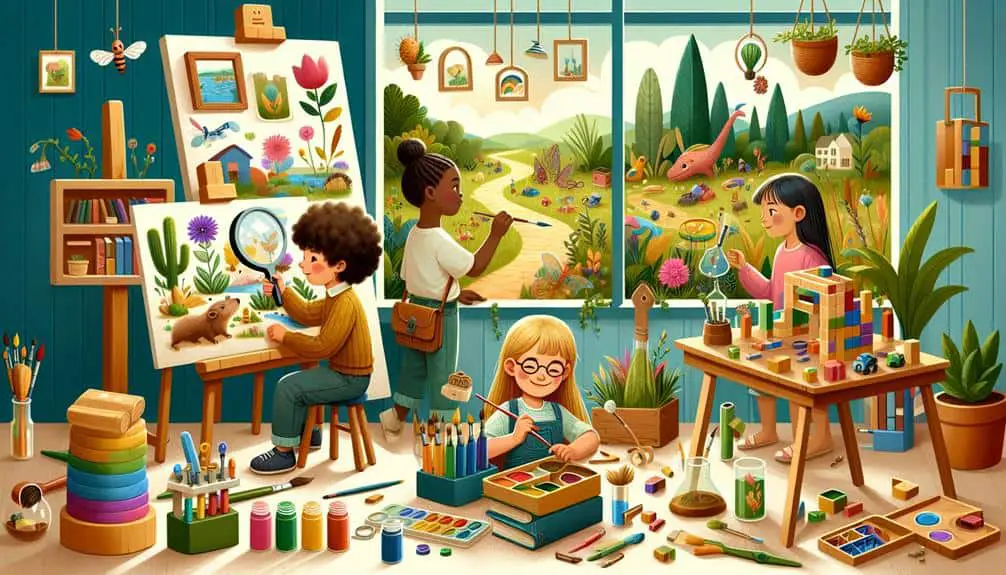Embark on a transformative educational journey at home with these top five strategies for successful project-based learning. Define clear learning goals to guide your projects effectively. Ignite curiosity by exploring diverse topics and engaging in hands-on investigations. Immerse into interactive activities for a deeper understanding by applying theoretical knowledge practically. Foster teamwork by establishing clear communication channels and defining roles within your projects. Celebrate milestones and lessons learned as you reflect on growth and set new goals. Unleash your full potential by implementing these approaches in your project-based learning journey.
Key Points
- Define clear learning goals to guide the project effectively.
- Encourage curiosity through open-ended questions and diverse topics.
- Provide hands-on experiences for deeper understanding and skill development.
- Foster collaboration and communication for meaningful teamwork.
- Celebrate achievements to motivate continued dedication and growth.
Setting Clear Learning Goals
To kickstart your project-based learning journey at home, begin by clearly defining your learning goals. Setting clear learning goals is vital for a successful project-based learning experience. Start by identifying your learning objectives and the skills you aim to develop. Goal clarification allows you to focus your efforts and track your progress effectively. By clearly outlining what you want to achieve, you give yourself a roadmap to follow throughout your project.
Monitoring your progress is another essential aspect of setting clear learning goals. Regularly assess how you're advancing towards your objectives and adjust your approach as needed. This practice guarantees that you stay on track and make the most out of your project-based learning experience. Remember, the purpose of defining your goals is to guide your actions and measure your success. Embrace this process as an opportunity for growth and skill development. Clarity in your learning goals will pave the way for a fulfilling project-based learning journey at home.
Encouraging Curiosity and Exploration
As you embark on your project-based learning journey at home, fostering curiosity and exploration is key to unlocking a world of learning opportunities. Encouraging curiosity-driven activities and providing time for exploratory playtime can greatly enhance your learning experience. Here are some strategies to help you cultivate curiosity and exploration:
- Pose Open-Ended Questions: Encourage questioning by asking open-ended questions that ignite curiosity and require critical thinking.
- Explore Diverse Topics: Introduce a variety of subjects and activities to expand your knowledge and interests.
- Hands-On Investigations: Engage in hands-on experiments or projects to promote exploration and discovery.
- Field Trips and Virtual Tours: Take virtual tours of museums, zoos, or historical sites to spark curiosity and provide real-world context.
Providing Hands-On Experiences
Engage in interactive activities to provide hands-on experiences that deepen your understanding and enhance your learning journey. Hands-on experimentation is a key element in project-based learning at home. It allows you to apply theoretical knowledge to practical situations, fostering a deeper comprehension of concepts. Through hands-on activities like conducting science experiments, building models, or crafting artistic projects, you engage in active learning that stimulates critical thinking and problem-solving skills. Creative problem-solving is honed as you encounter challenges and devise solutions in real-time, encouraging innovation and adaptability.
To maximize the benefits of hands-on experiences, set aside dedicated time for project work where you can immerse yourself fully in the task at hand. Create a designated workspace equipped with necessary materials and tools, ensuring a conducive environment for exploration and creativity. By actively participating in hands-on experimentation, you not only solidify your understanding of subject matter but also cultivate a sense of curiosity and discovery that fuels your learning journey.
Fostering Collaboration and Communication
Fostering collaboration and communication is essential in project-based learning, as it cultivates teamwork and effective interaction among participants. To enhance these aspects in your collaborative projects, consider the following:
- Establish Clear Communication Channels: Utilize digital platforms like Slack or Zoom to facilitate constant communication among team members. Clearly outline how and when communication should occur to avoid guarantee misunderstandings.
- Encourage Active Listening: Stress the importance of active listening within the group. Encourage members to paraphrase what others have said to ensure understanding and promote a respectful environment.
- Assign Roles and Responsibilities: Define specific roles for each team member based on their strengths and interests. This not only fosters collaboration but also ensures that everyone contributes meaningfully to the project.
- Provide Constructive Feedback: Create a culture where feedback is seen as a tool for improvement rather than criticism. Encourage team members to provide constructive feedback to help each other grow and enhance the quality of the project.
Celebrating Achievements and Learning Outcomes
To highlight the accomplishments and acquired knowledge, it's valuable to acknowledge the milestones reached and lessons learned throughout the project-based learning journey. Recognizing progress is essential to motivate and inspire continued dedication to the project. Celebrating achievements can take various forms, such as creating a visual display of completed tasks, hosting a virtual showcase for family and friends, or even just taking a moment to reflect on how far you've come.
Reflecting on growth allows you to see the evolution of skills and knowledge acquired during the project. It enables you to identify areas of improvement, celebrate successes, and set new goals for future projects. By acknowledging learning outcomes, you not only validate the effort put into the project but also gain a deeper understanding of your capabilities and potential for development.




